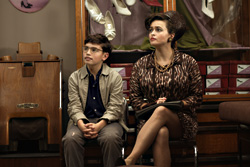For the 13th edition of the Seattle Jewish Film Festival, let’s ignore the politics of the Middle East, which are mostly absent from this year’s documentaries. The films SJFF offered up for preview emphasize family, ritual, and the mighty right foot of Bobby Charlton. He was a member of England’s 1966 World Cup squad and an unwelcome impediment to the celebration of a bar mitzvah for the young hero of Thursday’s opening-night feature, Sixty Six (Cinerama, 8 p.m., following a 5:30 p.m. cocktail party at Palace Kitchen). The Cup final is on TV on the same day he’ll become a man! None of the guests will come! What’s a kid to do?
This gently nostalgic British film presents a collision between the secular and the sacred, the spirit and, well, soccer. Verging on 13, Bernie Reuben (Gregg Sulkin) has big plans for his bar mitzvah, drawing up seating charts, collecting menus, hoping to eclipse the past celebrations of friends and his overbearing older brother. Helena Bonham Carter plays the kid’s warmly supportive mother. As his timorous, beaten-down father, Eddie Marsan is particularly fine, wordlessly communicating by crouch and wince and fumbled cigarette a kind of Semitic Willy Loman-ism, the pathos of a father who knows his kids look down on him.
This Britcom breaks no new ground when it comes to Jewish life (or sports, for that matter), but it’s extremely well-observed in the period details of what might be called pre-Beatles England: local grocers being crushed by new supermarkets, families breaking up around them, and television prying its way into the living room, never again to leave.
A bar mitzvah is also the centerpiece of the documentary Praying With Lior (Cinerama, 1 p.m. Sun., April 6; director Ilana Trachtman will attend). Here the barrier is not money or modernity but Down syndrome. Lior, son of two rabbis, isn’t expected to memorize long passages of the Torah, but he has to read and comprehend some essential lines of text. Naturally he’s more excited about choosing new shoes and a suit to wear; he also enjoys bouncing on the trampoline in the family’s backyard and, of course, Xbox.
The degree of access Trachtman was granted to this generous, loving Reform Jewish household near Philadelphia is remarkable, rendering some heartbreakingly candid scenes of coping with a disability. For viewers, witnessing such parenting challenges will cut across any line of faith. One needn’t accept the holy-fool premise of the film (“If there is a God, then Lior is definitely closer to God than anyone else I know,” says his brother), when there’s much other wisdom to absorb. As one of Lior’s classmates observes, whether it’s football or prayer, “it counts double” for Lior to overcome the impediments God has given him.
But what if God has bestowed a young believer with a devastating right hook? The documentary Orthodox Stance (Cinerama, 7:30 p.m. Sun., April 6) follows young Ukrainian immigrant Dmitriy Salita through several years in his pro boxing career. He has gifts, as opposed to Lior’s deficits, but also must maintain his beliefs in an accelerated culture impatient of those who stop to pray.
The Brooklyn-based Salita is irresistible as a human-interest story (particularly as many New York sportswriters are Jews). Whether he can fight on the Sabbath and how he schedules his bouts are guaranteed questions at press conferences. Likely for this reason, famous promoter Bob Arum (a Jew) signs the kid, even though he’ll never be a heavyweight or earn Tyson-size paydays. There’s the sense here that Arum and other glad-handers—including Michael Bloomberg and George W. Bush, who invites Salita to the White House!—are using the kid for publicity. (Director Jason Hutt will attend the screening, and can explain further.) Unlike Lior, Salita isn’t extroverted or lovable. Boxers should be guarded in the ring, but we never get to know the fellow. Others, including his rabbi and his Orthodox manager (the rabbi’s brother), do most of his talking for him.
Certainly, in outline, his life has a The Jazz Singer meets Golden Boy meets Champion salability to it. An enterprising young immigrant, whose mother died young, whose father hasn’t really adjusted to the new country—all you need to do is add a native-born girlfriend from a snooty family who attends temple on Fifth Avenue, and a Rocky-like underdog shot at the title in Vegas, where evil opponents tempt the kid with hookers and blow. (“Not now! I’m praying!”)
Without such embellishment, Salita won’t enter the history books alongside Jewish sporting greats like Max Baer, Hank Greenberg, Mark Spitz, or Sandy Koufax, but he keeps kosher in an admirably humble, hardworking kind of way. Too small and modest to become a flashy slugger on HBO, he nonetheless proves that tending the soul is something like training for a fight—a matter of practice, rigor, devotion.








